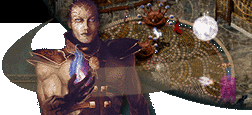GameSurge Editorial Rebuttal
DysoN of GameSurge wrote an editorial saying that "Baldurís Gate, isnít really an AD&D-based game". Below is an analysis of his editorial.
Silverdawn, February 25, 2000
I believe that BioWare was successful in bringing AD&D to the computer for Baldur's Gate. The game was fun to play and some compromises had to be made. The following are comments on points brought up by DysoN in his editorial:
- The initial method of rolling up statistics in BG was to pick your class, roll 4d6 and drop the lowest die, and then rearrange the statistics on a one-for-one basis. This was changed during playtesting to the current system as the testers' characters were too powerful. In BG, you can reroll as many times as you want, an option that isn't allowed in pen and paper (PnP) AD&D. Furthermore, the statistics play a greater role in CRPGs than RPGs as there is less role-playing and more combat. Even in Torment, you would need high scores to receive additional dialog choices. PnP gives you the flexibility to develop characters without the need for numbers to be checked; that is much harder in a CRPG unless you want it to be an adventure game. If you don't want to play a powerful character, reroll until you find a set of scores that are suitably low.
- If given the option to create your own character based on your PnP one, how many people wouldn't just put in all 18s (eg. AMANUJAK)? You can argue that that is up to the individual, but nothing is lost by forcing players to make a new character. Your DM in PnP doesn't just allow you to introduce a new character without his approval or balancing of it.
- Maximum hit points for a first level character is a very common house rule. It is also helpful for people that have never played AD&D not to die the first time they are hit by an opponent because they only had 1 hit point. At higher levels, the dice are rolled as per the rules, however, many people would still reload a save until they received maximum hit points.
- The starting gold in BG was (1d4+1) x 10 gp for wizards, 5d4 x 10 gp for warriors, 3d6 x 10 gp for priests and 2d6 x 10 gp for Rogues, just as in 2nd Edition AD&D. According to Luke Kristjanson (Lead Writer) on November 20, 1998: "Starting gold is determined by class about the same as in pen and paper AD&D. You start with the gold and that's about it. ". If your priest wanted to donate gold, they could have gone to the temple and done so.
- I can find no reference in the manual saying that mages were made weaker than their PnP counterparts. Because of the overpowered nature of missile weapons in BG, mages are actually more effective at combat than in PnP. It is frustrating to have only a few spells at low levels, but that holds true in PnP too. Finally, at least in single-player BG, you are playing a whole party, not just one character, like a mage. You can develop the party so that each character is an effective member of the team.
- Scrolls are indeed a valid way for finding spells in AD&D so I'm not sure why DysoN feels "In the AD&D game, there are no such things as 'scrolls,' that was something created by the developers of Baldurís Gate." In BG, you cannot find spell books, which is a common way in AD&D of finding spells after defeating enemy. But in anything but name, that is no different than finding a stash of scrolls.
- Finding ingredients for spells just becomes an annoying inventory hassle. It doesn't add anything to the game and hence BioWare removed the material component for all spells. Many PnP DMs just say you already have the ingredients or found them when shopping in the local town. The exception would be for some very powerful spells. I see no clear reason why making a mage find spell ingredients would make him more balanced, as DysoN is already saying that they are too weak. In his own words DysoN agrees: "if you were to find spell ingredients, it would be dull and boring, 'cause you're repetitively doing these."
- Casting times for spells were incorporated into the initiative system of BG (p. 75-76 in the manual).
- The Infinity Engine does not support infinite duration, hence the Armour spell or a Paladin's aura cannot last indefinitely. In BG, Armour lasts 9 hours (in-game spell description), not brief by any means. Armour does not get dispelled after getting hit for a certain amount of damage, but that is an advantage for the player and compensates for its lack of the infinite spell duration in PnP. Thus the following statement "even after the mage has received 8 points of damage, the player will have the same hit point(s) they started out with-talk about effectiveness" is untrue as Armour does not absorb the damage to you (such as an Aid spell would). Furthermore, using one spell as an example does not imply that all spells are weak. They may not be as versatile as in AD&D, but then neither is the computer, which is controlling all the opponents' actions.
Most of DysoN's concerns seem to be rules for rules' sake. BioWare has never claimed BG was an exact implementation of AD&D. The game had to be balanced for the computer without a DM. It definitely meets the criteria of "AD&D-based" that the DysoN feels it doesn't. A more exacting version of the AD&D rules can be found on the AD&D Core Rules and Expansion CD-ROMs. But they really aren't that fun to play.
|

